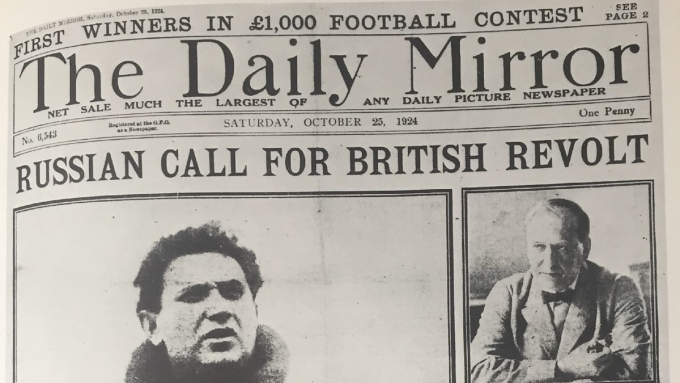With only weeks to go before a general election, and with a Labour victory expected, I am reminded of events of a century ago. In 1924, the minority Labour government headed by Ramsay MacDonald was forced out of power following a snap general election. One of the factors that led to Labour’s defeat was the notorious “Zinoviev Letter.”
Whether the Letter was decisive in bringing an end to Labour’s short-lived first government is contested by historians. But the story of the Letter remains of interest and may have some relevance to this year’s general election, and Labour’s effort to return to government after 14 long years of Tory rule.
Ramsay MacDonald was in some ways the Tony Blair of his time. The first Labour leader to become prime minister, he was later branded a traitor by his own party. He was no friend of the Soviet Union and had visited independent Georgia in 1920, returning to Britain more convinced than ever that the Bolsheviks were a disaster for Russia.
But during his short term as Prime Minister, MacDonald took steps toward recognising the Soviet state and opening trade relations with it. He did this not because he had suddenly become a Bolshevik sympathiser, but purely for pragmatic reasons. That pragmatism — one might call it lack of principle — was revealed just weeks before the general election. When the Red Army and Cheka bloodily suppressed a Georgian uprising in August 1924, MacDonald’s government initially showed some sympathy for the Georgians — but swiftly embraced a more practical approach, eventually denying that the Soviets had massacred the Georgians (which they had).
And yet the Tories saw him as pro-Bolshevik and his Labour Party needed to be ousted from office. If the usual methods of electoral politics were not enough, the Conservatives didn’t hesitate to employ dirty tricks against a leader they saw as dangerously left-wing.
Just days before the election, the Daily Mail published an extraordinary document. It was a letter from Grigory Zinoviev, leader of the Communist International, to the British Communist Party. The letter called on the comrades in Britain to prepare for armed insurrection, including creating cells of a future Red Army inside the ranks of the British military. According to the Letter, the Labour government’s decision to open trade with the Soviet Union created the conditions for a successful proletarian revolution in Britain and elsewhere.
Zinoviev publicly denounced the document as a fake. He pointed out a number of flaws, among them the fact that the letterhead referred to the “Third Communist International” which was, of course, not the name of the organisation he headed.
But the British intelligence services came down on the side of the Daily Mail, insisting that the letter was genuine. Labour, which had been on course to lose the election, then lost it decisively.
Decades later, historians and archivists came to the conclusion that the document was forged by White Russians. Other forgeries were to follow, including the “Eremin Letter” published in 1956, which offered “proof” that Stalin had once been a tsarist police spy.
A century on and Zinoviev is long forgotten. But some things remain — disinformation, including forgery, is still a factor in politics. Indeed, social media has given new life to “fake news” in a way that White Russian forgers in 1924 could only have dreamed of. And there is a still a Russian angle to the story.
According to some analysts, Labour’s greatest weakness today, as in 1924, is its perceived lack of willingness to counter a growing Russian threat. For today’s Tories, plans to spend billions more on defence, including a military draft, is really all they have to offer after 14 years in power. It is unlikely to help them much on election day.
For Tories with a sense of history, they must look back 100 years ago to the days when a mediocre forgery could help win them an election. Alas, Keir Starmer, who is as pragmatic as Ramsay MacDonald, seems on course to deliver a Labour government, with no 21st century version of the Zinoviev Letter likely to emerge.
This appears as my regular weekly column in the current issue of Solidarity.
